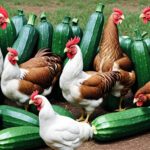When it comes to feeding your feathered friends, knowing what’s on the menu can make a significant difference in their health and wellbeing. Among a plethora of food options, can chickens eat celery, and if they can, does it benefit them? Poultry owners are frequently looking for nutritious and safe treats to supplement their chickens’ diet, and celery might just be on that list. In this comprehensive guide, we’re going to thoroughly dissect this question, providing you with surprising truths about incorporating celery into your chicken’s diet.
Celery is widely known for its health benefits in humans, but when it comes to our clucking companions, it’s essential to tailor their diet to their specific needs. Poultry enthusiasts understand the importance of a balanced and varied diet. So, can chickens eat celery, and more importantly, should they? Let’s unveil the depths of celery consumptions in poultry, ensuring you are equipped with all the knowledge you need to make the best dietary choices for your flock.
Understanding the Avian Diet: Is Celery on the Menu?
Before delving deep into whether chickens can be offered celery, it’s important to recognize the fundamentals of an avian diet dutch oven mac and cheese how vegetables fit into it.
Essentials of Chicken Nutrition
Chickens require a diet enriched with protein, carbohydrates, vitamins, and minerals. The primary food for most chickens is a balanced commercial feed that ensures all nutritional needs are met. However, treats and supplements, including vegetables like celery, can chickens eat parsley be introduced to add variety and extra nutrients to their meals.
Vegetables in a Chicken’s Diet
Vegetables can be a great source of vitamins and minerals companion planting for arugula chickens, adding not just nutritional value but also enrichment to their daily grazing. Celery, with its fibrous texture and water content, could offer some health benefits.
Celery for Chickens: Nutritional Facts and Benefits
To understand the potential benefits of celery for chickens, let’s break down its nutritional content and what it could mean for your flock.
What Does Celery Contain?
Celery is known for its low calories and high water content. It’s also a good source of vitamin K, vitamin A, potassium, and folate, among other nutrients. These nutrients can contribute positively to a chicken’s health when consumed in moderation.
Potential Health Benefits
- Hydration: With its high water content, celery can help in keeping chickens well hydrated.
- Vitamins: The vitamins in celery can support the immune system and vision, among other bodily functions in chickens.
- Fiber: The fibrous nature of celery aids in digestion, although chickens’ digestive systems are different from humans’.
However, moderation is key. Too much celery could pose risks due to its stringy texture and potential choking hazard, or if the nutritional balance of their main diet is disrupted.
How to Safely Introduce Celery into Your Chicken’s Diet
If you’ve decided to allow your cast iron chicken breasts to munch on celery, it’s imperative to do so safely to avoid any health complications.
Preparing Celery for Chickens
It’s essential to prepare celery properly before offering it to your can chickens eat cookies:
- Chop it up: Cut the celery into small, manageable pieces to prevent choking.
- Organic is best: To reduce exposure to pesticides, organic celery is a safer bet.
- Wash thoroughly: Always wash the celery to remove any dirt or residual chemicals.
Feeding Guidelines
- In moderation: Celery should only be a treat, not a staple in their diet.
- Monitor your chickens: Keep an eye on your chickens when introducing any new food to ensure they are eating it correctly and not experiencing any issues.
While chickens with afros can peck at an array of treats, caution and care are necessary, especially when serving them celery.
Common Concerns When Feeding Celery to Chickens
Incorporating celery into your poultry feed isn’t without its concerns. Let’s address some common questions and apprehensions chicken owners might have.
Choking Risks with Celery’s Stringy Texture
The fibrous strings in celery pose a potential choking hazard for chickens. Minimizing this risk involves proper food preparation—chop celery into small, easy-to-eat pieces, ensuring the strings do not cause any issues.
The Nutritional Balance of a Chicken’s Diet
Adding too much of any one food can disrupt the balance of nutrients necessary for chicken health. Celery is no exception; it should be fed in appropriate quantities to avoid any potential nutrient imbalances.
Possible Digestive Issues
While the fiber in celery is beneficial, an excess can lead to digestive issues in chickens. Monitor their droppings for any changes that might indicate digestive upset and adjust their diet accordingly.
Can Chickens Eat Celery Leaves and Seeds?
When adding celery to your chicken’s diet, you might wonder if the leaves and seeds are also safe for consumption.
Celery Leaves: A Green Treat
Celery leaves are generally safe for chickens and can be given to them in moderation. They are often softer and easier to eat than the stalks and contain similar nutrients.
The Scoop on Celery Seeds
Celery seeds are extremely small and could be a choking hazard. If you opt to offer celery seeds, ensure they are ground up to reduce the risk of choking.
Alternative Healthy Treats for Chickens
If you’re hesitant about celery or looking for more variety, there are several other healthy treats that chickens can enjoy.
Recommended Chick-favorite Snacks
- Cooked grains: Rice, quinoa, and other grains are good options.
- Leafy greens: Spinach, kale, and lettuce can be a source of vitamins.
- Fruits: Apples, berries, and melons are enjoyable in small quantities.
Always research and introduce new treats thoughtfully, ensuring they contribute positively to your chickens’ diet.
Final Thoughts: Should You Feed Your Chickens Celery?
To sum up, can chickens eat celery? Yes, they can, but like any treat, it should be given in moderation and with the proper precautions in place.
Celery can be a crunchy, hydrating snack for your chicken, offering additional nutrients and variety to their diet. Similarly, celery leaves and seeds, when appropriately prepared, can be a part of your flock’s dietary lineup. It’s vital to prioritize a balanced main diet, using celery and other treats as mere supplements. Keep an observant eye on how your chickens react to celery, and always be ready to adjust their diet as needed.
Understanding and catering to the dietary needs of your chickens is a responsibility that comes with the joys of poultry ownership. With the surprising truths now unveiled, you’re equipped to make informed decisions that enhance the health and happiness of your winged wards. Celery, when utilized wisely, can be part of the diverse world of poultry gastronomy that keeps your chickens clucking contentedly.







